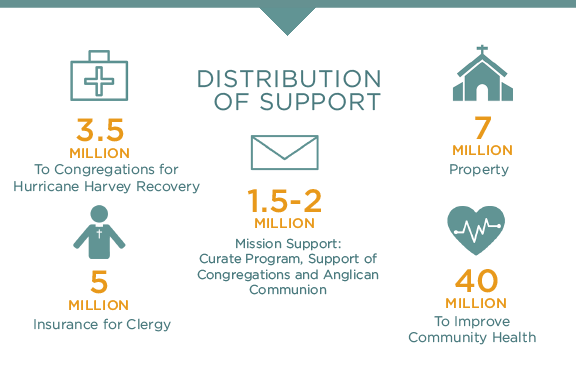Ministry in the Diocese of Texas has benefited from the generosity and foresight of many people. In 1950, when Bishop Clinton Quin first sought funding for St. Luke’s Episcopal Hospital in the Texas Medical Center, he went to Houston oilman Roy Cullen and asked for a million dollars. Cullen faithfully wrote out the check that day. No one could have imagined that 63 years later, the expanded health system that grew from an initial tertiary care facility would yield the Episcopal Health Foundation (EHF) as well as another dedicated to planting new churches. EHF makes grants from the interest on the billion dollar corpus, and the Great Commission Foundation—with a corpus of $126 million—provides funding for new church plants.
When Pete Coffield, who attended St. Thomas, Rockdale, died in 1979, he left a vast estate to the Boy Scouts, the Salvation Army and the Episcopal Diocese of Texas. With expert oversight from many talented board members, Coffield’s initial $25 million gift established the Episcopal Foundation of Texas and today has a corpus of $75 million. The board has made more than $65 million in grants funding outreach over the last four decades—a return on investment that would please Coffield.
Support for churches affected by Harvey’s flooding in August 2017 has been an important part of recovery across the Diocese. Affected congregations immediately received capital support for building recovery, revenue shortfall, clergy and staff support totaling more than $5.5 million. In some cases, the foundation partners with Episcopal Relief & Development to work within impacted communities, to empower churches to continue doing God’s work while re-acclimating to a new normal. One such program addresses domestic violence and sexual assault issues, which have increased in some communities after Harvey due to personal upheaval and loss of jobs.
“Immediately following Harvey, it was important to get an assessment of each congregation’s needs and prioritize them,” said David Fisher, foundation director for the Diocese. “We first wanted our congregations to be supported so they could then assist their communities and we are privileged to continue this work.”
Several grants in 2018 illustrate the breadth of ministry supported by the diocesan foundations. Grants have touched a group of especially vulnerable people in Section 8 HUD housing in Nacogdoches, Latino immigrants in Austin and cancer patients in Gaza.
 Christ Church, Nacogdoches received a Strategic Mission Grant (SMG) to take church to low-income tenants with physical disabilities who live near Christ Church. The SMG is supported by the Bishop Quin Foundation, the Episcopal Foundation of Texas and the Great Commission Foundation with a focus on church growth and deepening relationships within their grantee’s respective communities. The missional community at the Independence Manor, guided by members of Christ Church, has a regular Sunday morning Eucharist and Bible study that engages residents who participate in the setup and as lay readers. A shared lunch, provided by Christ Church, serves to deepen growing friendships in this innovative way to meet a need in the community.
Christ Church, Nacogdoches received a Strategic Mission Grant (SMG) to take church to low-income tenants with physical disabilities who live near Christ Church. The SMG is supported by the Bishop Quin Foundation, the Episcopal Foundation of Texas and the Great Commission Foundation with a focus on church growth and deepening relationships within their grantee’s respective communities. The missional community at the Independence Manor, guided by members of Christ Church, has a regular Sunday morning Eucharist and Bible study that engages residents who participate in the setup and as lay readers. A shared lunch, provided by Christ Church, serves to deepen growing friendships in this innovative way to meet a need in the community.
In 2018, the Episcopal Foundation of Texas provided a special $200,000 grant to El Buen Samaritano in support of their family and health literacy programs in addition to $100,000 granted for their 2018 operating needs. El Buen Samaritano is an outreach ministry of the Diocese committed to helping Latinos and other families in Central Texas lead healthy, productive and secure lives through high-quality and affordable health care, education and economic-stability services.
The Bishop Quin Foundation, formed in 1943, supports church growth in a number of ways: through redevelopment, sabbatical grants and curate grants as well as participating in the Strategic Mission Grant program. In 2018, Bishop Quin granted the Al Ahli Arab Hospital in Gaza City, Gaza $300,000 to design a new radiation oncology center for the hospital, a ministry of the Anglican Diocese of Jerusalem. The project was a joint venture with MD Anderson that will provide external beam radiation treatments for cancer patients. More information on diocesan foundations may be found at: www.epicenter.org/foundations.
 Christ Church, Nacogdoches received a Strategic Mission Grant (SMG) to take
Christ Church, Nacogdoches received a Strategic Mission Grant (SMG) to take 